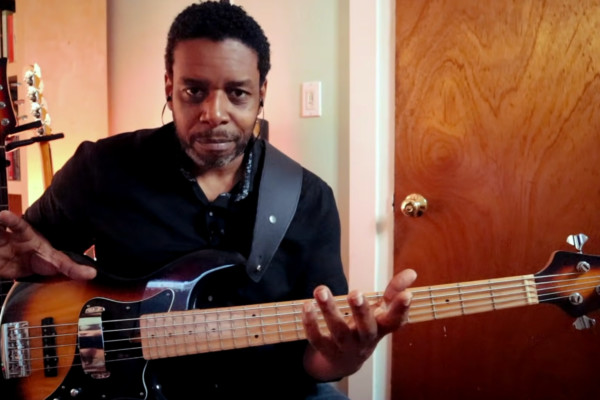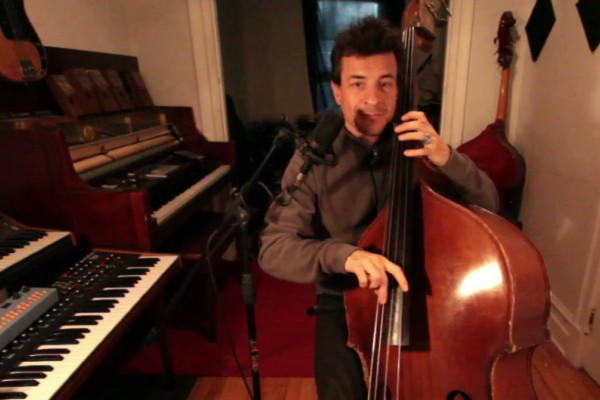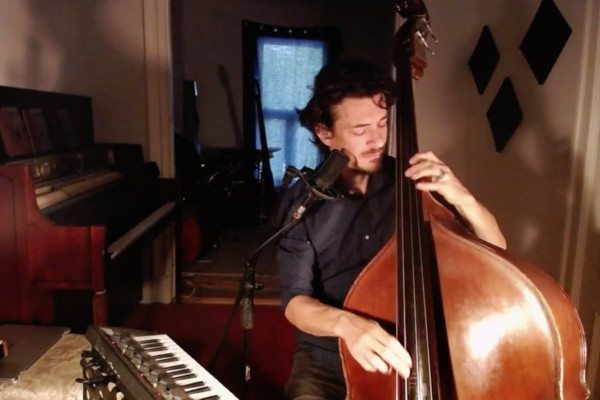Soloing on Bass: What Do You Think About?

Q: What should one be thinking when soloing? Do you simply hum the melody in your head or do you think of the solfege/scale degree at the same time? I try to sing the solfeggi, but when it comes to some scalar sequences or faster phrases, I feel like my head might explode. But if I stop singing the solfeggi, I feel guilty for not having good control of what degree I’m in. What are you thinking when soloing?
A: This is an interesting question and brings some interesting thoughts to mind.
First, you may want to check out two related columns I’ve written, one on soloing and the other on practice ideas.
To answer your question, my first thought was this: what’s going through my mind is different for almost every solo, in many ways. At the best of times, there is very little going through my mind (the more open my ears are, the less I need to think).
For me, soloing has been the moment where I essentially just hold my hands up to the music gods and see what happens. Much of what happens when we improvise is subconscious. We don’t have time to think through every little thing when the music is happening, so it’s more a matter of what is built into our muscle memory. That’s not just the shapes and licks here, but also our brain’s muscle memory… hands and brain.
When I improvise, I very much tend to play like whatever I’ve been working on lately. Usually, how we practice is how we will play. In those times when I’m focusing on rhythm, my solos tend to reflect that. When I’m in the zone with working on changes at home, my solos tend to have more melodic content. Melodically, I’ve always focused on arpeggios, so I tend to play very arpeggiatically no matter what. It’s deeply ingrained.
Every solo will be different depending on what you’ve been working on, your mood, how good the room and your mix is sounding, and the musicians around you. You can’t really prepare for much with those variables, but there are things you can do that should help.
Your solo is going to be the culmination of everything that you have worked on.
At that moment, you get to speak freely and so it really comes down to what you have to say and how hard you’ve worked on your vocabulary. That includes motivic development, scalar patterns, getting away from the root (for us bass players), chord scales, rhythmic internalization, polyrhythms, and so on). Even if your mind goes blank, that stuff will come through.
The amount of success you have will be fairly dependent upon how well you’ve prepared
If you practice well and thoroughly through a myriad of ideas and techniques (both melodic and harmonic) then you will likely have something to say.
Give your solos shape, use motivic development, space and harmony
My conscious goals during a solo are generally to give it a shape, use motivic development, allow for space and breath and outline the harmony (but not be obvious about it). Much of what is actually going through my head has to do with target notes. I like to think ahead in the changes and pick spots where I want to land on specific notes. When I’m thinking of those notes, I am thinking of their chordal relationship. For example, “I’m going to land on the 9 on that C-7 chord coming up.)” Then, I listen to see what wants to happen next.
Avoid playing fast (too long)
I consciously try not to play too fast for too long. Try to listen and interact with what’s happening around you musically, and to play with rhythm a little bit. For the most part, I’m simply looking at the changes, looking at where I am on the fretboard, and look ahead to where I am going and try and play musically while traveling from point A to point B.
Think scale degrees or chord degrees
In the very literal sense, I am generally thinking scale degrees or chord degrees. For example, using #11’s on this or that chord, for example. I am also thinking of chordal substitutions. I might decide to play F# Lydian over that Cø7 chord, or maybe playing E Melodic minor over that C?7#5 chord. That is the kind of “math” substitution work that must be drilled into the head and hands in the practice shed, as there’s just not enough time to think through that stuff on the bandstand. This is the harmonic gold that allows bassists to play more freely over changes because a) we get away from the root in our minds eye and b) this approach is less common for bassists below a certain level so this type of playing stands out when the bass player does it.
One last thought: all of my examples assume you are soloing over changes. Things get trickier when it’s a one chord vamp or something similar. I am still very much thinking of scale and chord tones in those cases, but I will likely also start inventing my own chord changes to help my line move around a little bit more.
For example, even just imagining a bar of D-7 and a bar of G7 while you are soloing over a C vamp can help to add melody to your lines. The inclusion of diminished lines and altered chords placed in harmonically appropriate places can really hip it up. This takes a certain understanding of jazz harmony (back to the shed again).
In the end, it all leads back to what you are working on in the shed. For this reason, I try to vary my approach in the shed and make sure that I work on anything I can think of that I don’t fully have under my hands. Lately, for me, this has been how to play comfortably over less common chord types. This won’t help me on the funk gig but the chances are I’ll be grooving my way through any solos on those gigs anyway (which is where the rhythmic homework I’ve done comes into play!).
Work on time, feel, playing through changes in the Real Book and learning different styles of music. It’ll come through when the time comes!
Here’s one more helpful hint when working through changes in the Real Book: keep a running list by your practice area of chord types that give you pause. Explore what chord scale might be the best for each chord type and mark it down on the list. Then explore other modes and scales that you like over that chord (using any note in the chord scale as your new root). Keep growing that list and practice over those chord types. I make practice loops of one chord to play over. Very helpful!
Readers, how about you? What goes on in your mind when you’re taking a solo, and how do you prepare for those moments? Please share in the comments.
Have a question for Damian Erskine? Send it to [email protected]. Check out Damian’s instructional books, Right Hand Drive and The Improviser’s Path.




Depends the song, the crowd, the vibe, the everything…..but dude, if you got chops, freakin’ flaunt those chops! The whole “Everyone leaves during the bass solo” thing is over. SO many good bassists out there that can own a crowd for 3 minutes and draw a standing ovation!!!
I’m usually thinking about my financial situation, and how many notes I’m putting into the space. I get paid by the note, and I am working CHEAP! I had to do it! Great article!
I just play what I feel, I want it to be melodic, but not worked out. I’m not one of those bass players that can copy other players solos note for note, so I really have to rely on my experience as a player.
Victor says that if people go to the bar to get a drink during your solo, that’s YOUR fault. You can pull off pretty much anything, as long as you don’t lose the groove.
Know where the “Bad” notes are, and learn to avoid them. note: ALL tones are useable to some degree, with preparation.
I think about milk and cookies.
I think about nothing unless I’m in the practice environment. I’m just trying to listen to whats going on around me. The “You Play What You Practice” thing is correct. Blowing chops won’t save a lousy soloist from being lousy (took me some time to learn this one). Melody and space will. Also interesting rhythmic ideas can really add intensity and something unique without having to be notey. Also, the rhythmic phrasing of the melodic line isn’t necessarily the same as the rhythmic phrasing of a bass line and yet both sides have a weird way of informing each other.
I try NOT to think. That’s what practicing is for. But I’m heavily influenced by classical singing (which I do).
move the fingers…
My approach to soloing is fairly simple. I know where I’m going to start and where I have to finish. Everything in between, for me, is a mix of scalar notes, rhythms, and at times different styles. I don’t do 2-3 minute solos by myself but rather my band plays a couple of songs that I get solos on.